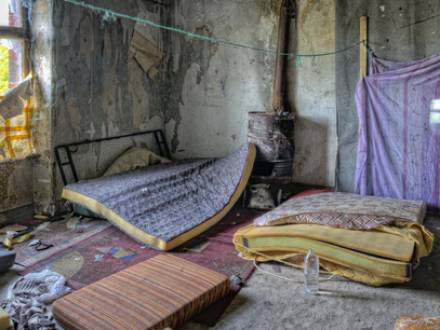Landlord’s Rights and Responsibilities Regarding Squatters
 Since housing has become so expensive and there are more and more homeless people across the United States, more landlords find themselves having to deal with the laws pertaining to adverse possession when attempting landlord eviction. Those who take advantage of adverse possession are often called "squatters." Unfortunately, it can be challenging to remove squatters from a property who may even try to meet the legal requirements to claim the property as their own.
Since housing has become so expensive and there are more and more homeless people across the United States, more landlords find themselves having to deal with the laws pertaining to adverse possession when attempting landlord eviction. Those who take advantage of adverse possession are often called "squatters." Unfortunately, it can be challenging to remove squatters from a property who may even try to meet the legal requirements to claim the property as their own.
Adverse possession laws vary considerably from state to state on both ends of the spectrum. For example, while California and Montana have the shortest occupancy periods regarding adverse possession, Arkansas, Florida, Utah, and Tennessee require seven years of occupancy, and New Jersey and Louisiana require 30 years of occupancy. If you are a landlord facing an adverse possession situation, you could benefit from speaking to an experienced Naperville, IL landlord eviction attorney.
What Is the Difference Between Squatters and Trespassers?
A trespasser usually enters a person’s property for a short period of time with no intent to stay. Law enforcement can cite trespassers and remove them at the landlord’s request. Squatters enter another person’s property without permission with the intent of staying there for the long term. Established squatters can be difficult to remove, and it is important that landlords follow the letter of the law when doing so.
What Are the Laws Governing Squatters in Illinois?
In the state of Illinois, squatting is an illegal form of trespassing. Penalties for a conviction of squatting include up to three years in jail, up to $2,500 in fines, and potential community service. That being said, while a short-term trespasser will usually be removed from your property quickly, an established squatter will likely require a more time-intensive eviction process.
While it may sound borderline ridiculous, squatters in the state can legally claim another’s property through adverse possession. The good news for landlords in Illinois is that squatters must fulfill many requirements before they can claim a property. A person who is attempting to claim a property through adverse possession must do all of the following:
- A squatter must not have permission from the owner of the property to stay; they must be uninvited and, presumably, unwelcome.
- The occupation of the property must continue for a specific amount of time for the squatter to qualify for adverse possession; any gaps in the occupation will damage the adverse possession claim. The time in Illinois is two years under 735 ILCS 5/13-107.1.
- The squatting must not be in secret; rather, it must be done openly.
- Squatters who apply for adverse possession must be the sole parties occupying a property and must present themselves to others as the rightful, legal owner of the property.
- After two years of continuous occupancy, the squatter must occupy the property, possess a color of title, and pay property taxes for at least five more consecutive years.
If all the conditions above are met, Illinois squatters may become eligible to claim property rights through the laws of adverse possession.
What Can Landlords Do?
First and foremost, Illinois landlords must be vigilant in watching over their properties so they can have trespassers removed immediately before they become squatters. If a landlord finds he or she inadvertently has squatters, a five-day Notice to Vacate should be issued. If the squatters refuse to vacate, an eviction lawsuit must be filed with the court.
Some landlords, in an effort to avoid this burdensome legal process, will offer the squatters money to vacate the premises. This is known as a "cash-for-keys" settlement. Squatters cannot be forcibly removed from a property until they have been issued a lawful eviction notice.
Contact a DuPage County, IL Landlord Eviction Lawyer
As a landlord, you should check on your properties frequently, make them as challenging to enter as possible, and keep up with outdoor maintenance so the property looks "lived-in." Should you find yourself facing an adverse possession situation, contact a Naperville, IL landlord eviction attorney from Appelman Law LLC. In addition to his law degree, Attorney Appelman has a master’s degree in forensic psychology. Call 630-717-7801 to schedule your free consultation.





